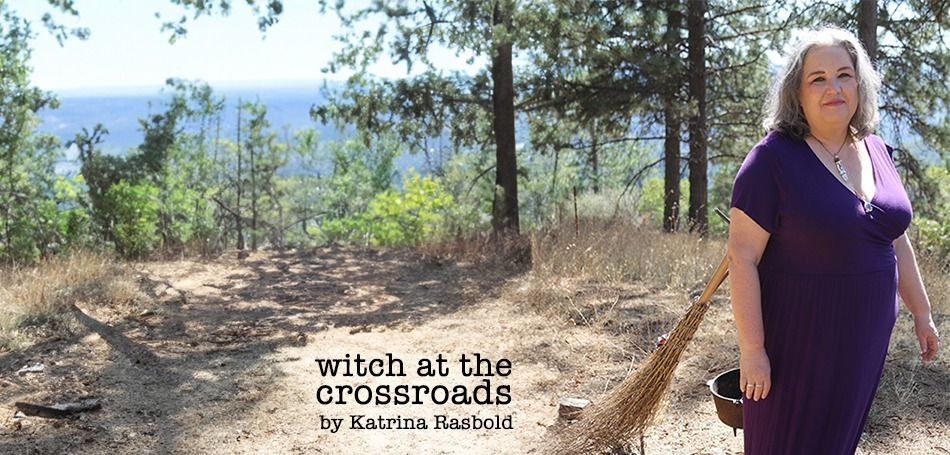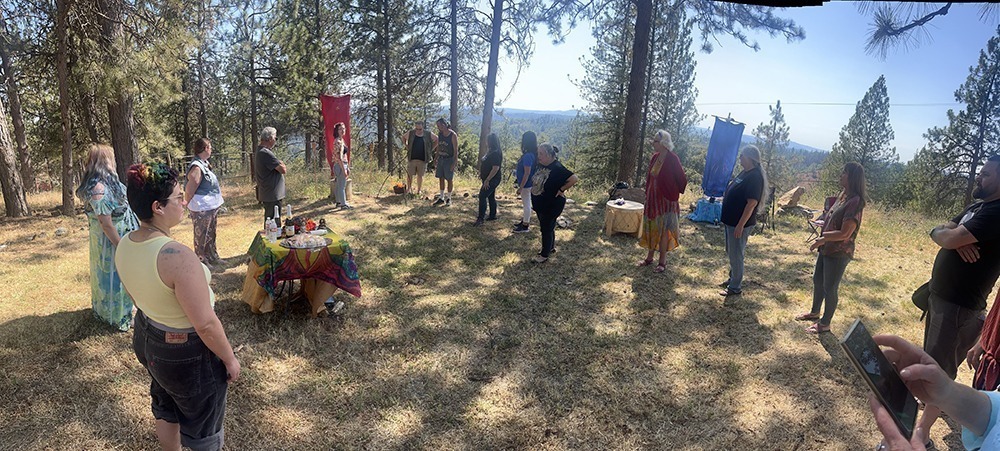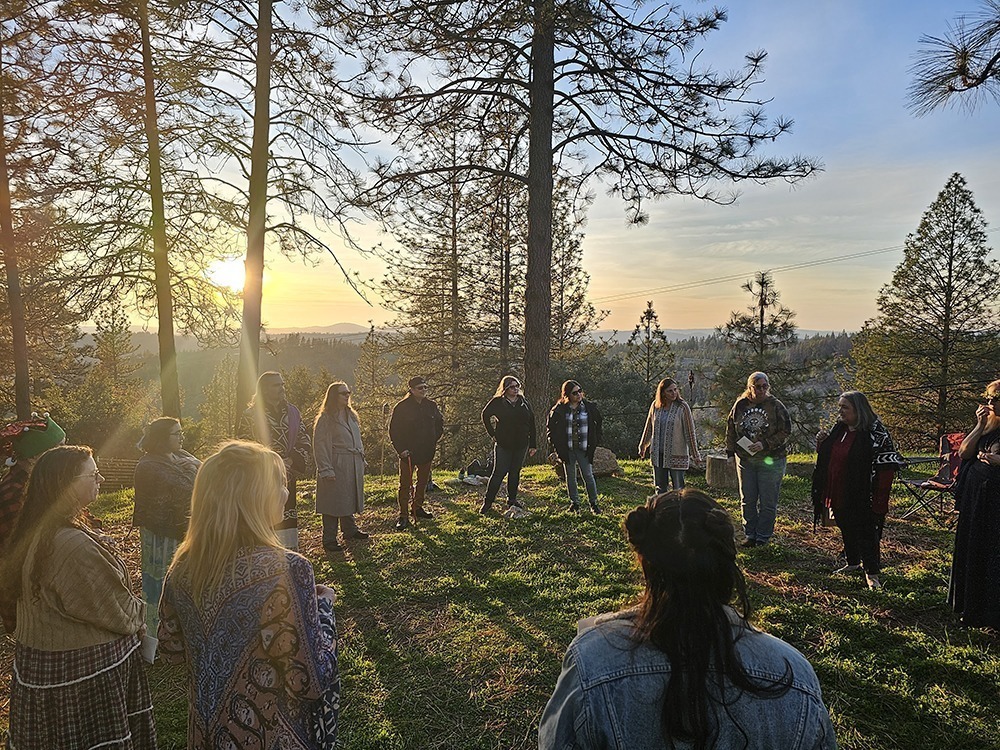
By Katrina Rasbold
If we are lucky, at some point in our Pagan lifetime, we will be invited to visit someone else’s ritual/grove/coven/circle/event to share in their practice. This could be at a public place such as a park or an event center or it can be at a private home or covenstead. In either instance, there are certain protocols of basic etiquette, tailored to Pagan practice, that are good to observe if you ever wish to be invited to another function. Keeping one’s name untarnished in the Pagan community is quite an extraordinary feat and it often starts with being a guest who maintains integrity and good manners.
One would imagine common sense etiquette goes in the category of “that goes without saying,” but as most people who have hosted Pagan events for years can tell you, it really doesn’t.
In no particular order, here are my top ten rules of Pagan etiquette where it applies to event attendance. In a later post, we will talk about how to be a good Pagan event host:
- Forget Pagan Standard Time. “Pagan Standard Time” is a concept that accommodates the inevitability that when you plan events, stuff is going to go wrong. It also excuses and laughs off poor planning that lands you at your location at a time unreasonably later than when the event was scheduled to begin. Yes, life happens, but if you find that you are a person who always seems to have circumstances prevent you from arriving on time to an event, you seriously need to re-evaluate your behaviors and priorities. It is inconsiderate and rude to be late to any scheduled meeting. Likewise, it is just as rude to arrive much earlier than the scheduled time. Often, groups use the time prior to an event to assemble their core members, go over individual roles in the event, set up, and take care of last minute challenges as they present. This is not when you want to play host to a guest. Fifteen minutes before the scheduled arrival time is forgivable, but ideally, you should arrive within five minutes before or after the slated time. That may sound like a tiny window to hit, but I have faith in you. If you know you will be delayed, make contact with the person who is in charge of the event or the one who invited you and ask what the standard procedure is for late arrival. Some groups do not allow entry into a circle once it is cast and others are comfortable cutting a door for you to enter. Just as important as arriving on time, know when to leave. Do not allow situations such as intoxication, car problems, or other issues to cause you to overstay your welcome. Read social cues and when the masses begin to exit, take your leave as well. Many groups observe Pagan Standard Time and start their events whenever they feel like it, but you cannot control them; you can only control you and punctuality is a courtesy.
- Bring Food/a Gift/Donation. Even if you do not intend to stay for the feast, contributing to the meal or to the circle is part of the “thank you” to the circle for inviting you to join them. Your contribution does not have to be elaborate, but bring something. In lieu of food, you may want to bring a gift for the group itself. Consumable such as tealights, incense, sage sticks, etc are always appreciated. This is also a nice gesture if there is no potluck meal afterwards, just to say thank you to the people who work their butts off to create the event for others to enjoy. If you are going to eat, however, always bring a food contribution of some kind, even if it is a bag of chips you grab from the grocery store or three cans of jelled cranberry sauce you got from the food bank. Don’t be that guy. If you have special food needs (gluten free, vegetarian, high protein, sugar free, etc), bring food that you can eat and be prepared to share it. Do not expect your host to accommodate your special dietary needs. Potluck means exactly that.
- Do not smoke or vape in ritual or other sacred time. If you are a smoker, ask your host or the person who invited you to point out designated smoking areas. Never leave butts on the ground and do not smoke outside of designated areas. I refuse to acknowledge the “tobacco is a sacred herb” argument. If you are a medical marijuana user, do not light up around other people, even if you are legally entitled to do so. That is also a “designated smoking area” activity and should be cleared with your host first. If you are in doubt, medicate in your own car.
- Never miss a chance to shut up. Do not interrupt those who are speaking in circle. Do not chime in during ritual with your own experiences or thoughts unless invited to do so. Never correct circle speakers in ritual even if you know for a fact that you are right and they are wrong. (“Excuse me, it is pronounced Hek-CAH-te, not HEK-a-tay.”) It is fine to have a conversation about differences in practice, facts, or beliefs after ritual is over, but never during. Even if you are correct, it is completely inappropriate to “call out” a circle speaker during ritual. Ritual is the time when you watch and learn how other groups worship. It is not your “sharing” forum unless it is part of the agenda to do so. When the group is called to assemble for entry into the circle, all joking, chatting, elbowing, poking, and other social guffawing ends. Center up, go into Higher Self, and be reverent and quiet unless chanting or singing is involved. If you find you have something negative or even constructive to say about the event, show restraint and do not do so until you are away from the event grounds. Honor the invitation you received, thank your hosts even if you did not enjoy yourself, and keep any negative thoughts to yourself until you are well away from the premises. More so than in any other community I know, word travels swiftly and aggressively in the Pagan community and if you talk smack about someone, they will eventually find out, so be prepared to own, and possibly eat, any words you say about events you attend.
- Do not bring children, pets (including service animals), or guests to an event without asking first. Some events may take place in areas that are not child safe while others may contain material that is inappropriate for children. Some groups are not comfortable working with children on site. Always ask. Regarding pets, it is within the rights of anyone to insist that a service animal be allowed to attend a function with them. The challenge is whether pets living in the host’s home will respond favorably to new animals coming in, no matter how well trained they may be. Sometimes, rituals are space-limited and can accommodate only a specific number of guests. Rituals may have interactive props for each person participating in the ritual (like a candle for procession or a maypole ribbon) and require a specific head count. If the event is at the host’s home, do not bring people who will not participate in the ritual, such as a spouse or significant other who is not Pagan but wants to come anyway. Rituals and events are not dog and pony shows with an audience section. It is also uncomfortable for some people to leave a stranger unattended in their home or on their property while they perform the ritual. Always ask first. This does not apply if the event is at a park or other public place.
6. Leave if you become uncomfortable during the ritual, whether it is with a practice that takes place that you did not expect or because of a weird feeling you get, do not second guess yourself. Traditionally, the circle leaders or guardian are the people who can cut a door in a cast circle. Discreetly ask one of them to do so and let them know that you have an emergency and must leave. No one should ever forbid you to do so. If they do, then excuse yourself and leave anyway. For some intensive rituals, it is outlined at the beginning of the ritual that the energy balance depends on all participants remaining in place and contributing to the ritual for its duration. If you commit yourself into this type of process, you should stay if at all possible. Although it may seem more appropriate to remain in ritual rather than to trouble your hosts for an exit strategy, consider that your discomfort can contaminate the energy of the circle for everyone there.
7. Make certain your cell phone is off, not just silenced, for the duration of the ritual.
8. Always ask ahead of time what type of dress is appropriate for the ritual. It can be awkward to presume skyclad and find out it is not (too late) or to presume it is not skyclad and find out it is. Also, ask if there is anything you should bring. If the ritual is outside, it is always wise to bring your own camp chair. Seating is often a problem at events.
9. Do not disrupt the integrity of the circle’s energy. For instance, if a group chalice is used for cakes and ale and you are not comforting drinking with others or if you cannot safely consume what is in the cup or what is used for cakes, simulate the ritual without actually consuming. Do not stop the ritual to ask for an all natural, organic lemonade. If you are medically unable to stand for the duration of a ritual, ask in advance if a chair can be placed inside the circle for you to use if necessary rather than stopping circle to go retrieve one in mid-ritual.
10. Respect the privacy and integrity of your hosts. Do not go into areas where you have not been invited. Ask before seeking out the bathroom on your own. Make certain toilet paper is in place before you sit down. Do not open drawers, cabinets, or doors without permission. Do not touch sacred or altar items without permission. Do not enter the circle area before you are told to do so. Honor that someone invited you to share their personal home and sacred space. Be kind to any animals you encounter on the property. They live there; you do not.
These are only ten of literally hundreds of ways you can make your visit to a Pagan event more enjoyable for everyone concerned. Feel free to list some of your own suggestions in the comment section of this post.
 Katrina Rasbold is a professional Witch, published author, priestess, and editor of Green Egg Magazine. She and her husband, Eric, are the creators of the CUSP spiritual path and owners of Crossroads Occult. She and Dahlia Rose host the popular livestreamed video broadcast “Crossroads of Cognizance” most Thursday afternoons. You can reach her through www.katrinarasbold.com.
Katrina Rasbold is a professional Witch, published author, priestess, and editor of Green Egg Magazine. She and her husband, Eric, are the creators of the CUSP spiritual path and owners of Crossroads Occult. She and Dahlia Rose host the popular livestreamed video broadcast “Crossroads of Cognizance” most Thursday afternoons. You can reach her through www.katrinarasbold.com.


